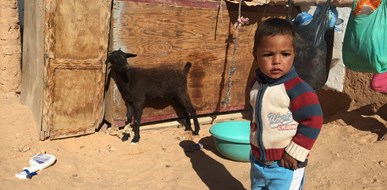[New publication]: The legality of economic activities in occupied territories
Published 11 August 2020
Shutterstock: Sahrawi refugee camps, Sahara
This week, academic publisher Routledge issued a new edited volume on the legality of economic activities in occupied territories, edited by Asser institute senior researchers Dr Antoine Duval and Dr Eva Kassoti. The book, The legality of Economic Activities in Occupied Territories, is aimed at academics, practitioners and policy-makers, and explores the question of the lawfulness under international law of economic activities in occupied territories. It does so from the perspectives of international law, EU law, and business and human rights.
Background
Providing a multi-level overview of relevant practices, policies and cases, the book is divided in three parts, each dealing with how different legal fields have come to grips with the challenges brought about by the question of the lawfulness under international law of economic activities in occupied territories.

The first part of the book includes contributions pertaining to the international law dimension of the question. It contains chapters on the conjunction between jus in bello, jus ad bellum and international human rights law in the context of exploitation of natural resources in territories under belligerent occupation; on third party obligations flowing from the application of occupation law in relation to natural resources exploitation; and on State practice with regards to trading with occupied territories.
The second part focuses on EU law and contains contributions that assess the EU’s approach to occupied territories and the extent to which this approach comports with the EU’s obligations under international law; contributions providing an in-depth assessment of the case-law of the Court of Justice of the European Union (CJEU) on occupied territories; as well as contributions pertaining to the political considerations that may influence the legal framing of questions pertaining to occupied territories.
The final part focuses on the business and human rights perspective, with chapters on investment arbitration as a means for holding the occupant accountable for its conduct towards foreign investments and investors; on the role and impact of the soft law framework governing corporate activity (such as the UN Guiding Principles) on business involvement with occupied territories; as well as a final case study on the dispute involving Israeli football activity in settlements located in the Occupied Palestinian Territory and the legal responsibility of the international football organisation FIFA in this regard.


Antoine Duval is senior researcher in international and European Law. Eva Kassoti is senior researcher in international and European Law as well as the academic co-ordinator of the Centre for the Law of EU External Relations (CLEER) at the Asser Institute. They are both part of the Asser institute research strand Advancing public interests in International and European Law, which examines how international and European law may further the protection of public interests in an increasingly globalised world.
